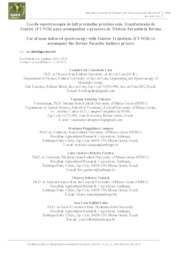Use of near-infrared spectroscopy with Fourier Transform (FT-NIR) to accompany the Bovine Parasitic Sadness process.
Use of near-infrared spectroscopy with Fourier Transform (FT-NIR) to accompany the Bovine Parasitic Sadness process.
Author(s): LUIZ, L. da C.; TEIXEIRA, V. A.; CAMPOS, M. M.; PEREIRA, L. G. R.; TOMICH, T. R.; LEITE, J. L. B.; BELL, M. J. V.; ANJOS, V. de C. dos
Summary: Cattle are animals that stay in the herd for a large period of the day in the open air pasture. This daily routine leaves them exposed and susceptible to infectious diseases. One of them is the Bovine Parasitic Sadness which is considered one of the greatest cattle health problems due its high rate of mortality and morbidity. In this work preliminary results are presented from calf inoculated with anaplasmosis. Blood samples were collected and analyzed through Fourier Transform Near Infrared spectroscopy (FT-NIR). The animal was monitored for 60 days until its recovery. This exploratory work shows the potentiality of the FT-NIR in the detection, follow-up and recovery of the anaplasmosis. The possibility of prevention of this disease in the herd via a fast optical analysis may bring a great breakthrough in disease control in dairy and beef cattle.
Publication year: 2021
Types of publication: Journal article
Unit: Embrapa Dairy Cattle
Observation
Some of Embrapa's publications are published as ePub files. To read them, use or download one of the following free software options to your computer or mobile device. Android: Google Play Books; IOS: iBooks; Windows and Linux: Calibre.
Access other publications
Access the Agricultural Research Database (BDPA) to consult Embrapa's full library collection and records.
Visit Embrapa Bookstore to purchase books and other publications sold by Embrapa.

